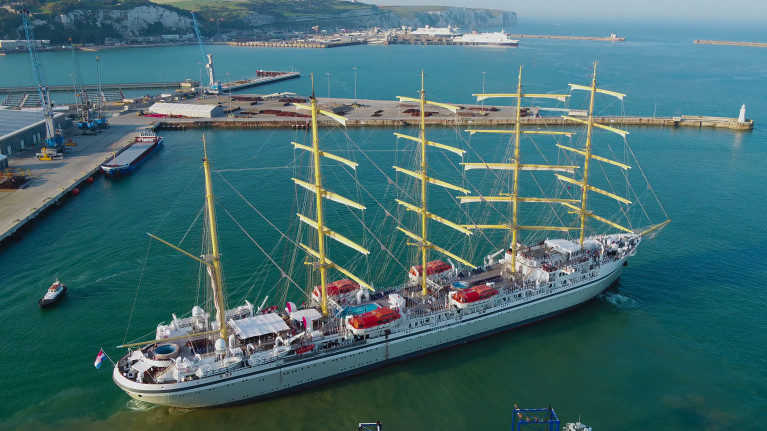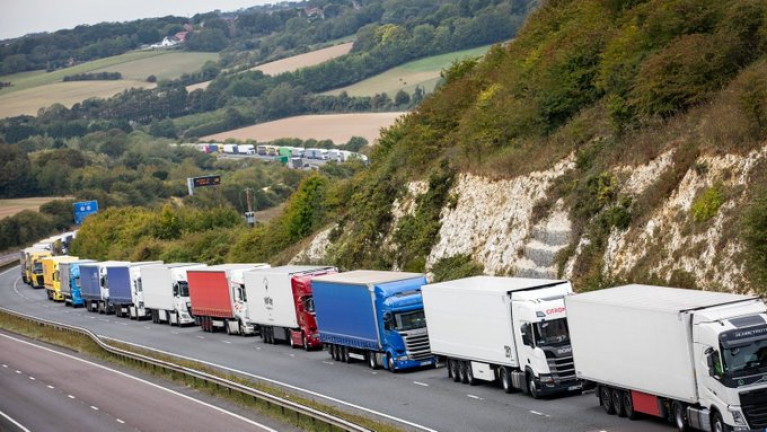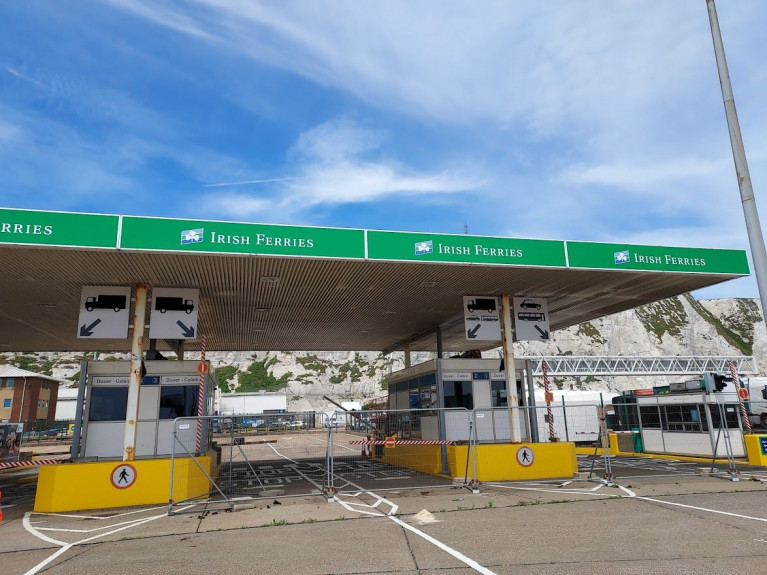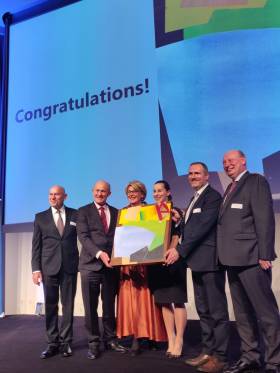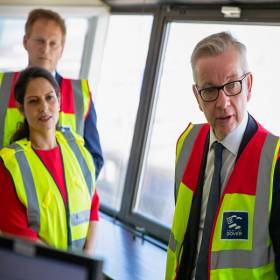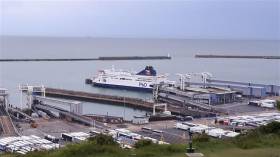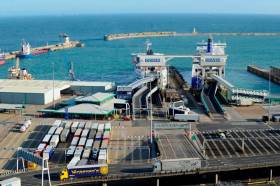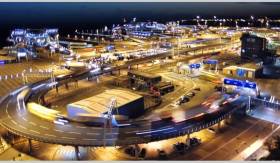Displaying items by tag: Port of Dover
ESPO Congratulates Eco-Port Member Port of Dover with Third 'Port Environmental Review System' (PERS) Certification
The European Sea Ports Organisation (ESPO) has congratulated the Port of Dover (UK) for being certified through the EcoPorts’ environmental management standard (PERS).
The ferry port of Dover is a long-standing EcoPorts member, being in the Network since 2003 and is now certified for the third time under the PERS.
Isabelle Ryckbost, ESPO Secretary General, commented: “The investments and work of the Port of Dover in the field of clean energies both for shipping and port operations, biodiversity, and monitoring pollution are truly impressive. We are happy to see the Port of Dover being PERS certified for the third time. It is certainly a well-deserved certificate for the team in the Port of Dover who is full of green engagement”.
“I am very happy with the commitment and dedication shown by the Port of Dover when it comes to environmental management and involvement in the EcoPorts community. Its continuous engagement with environmental issues is coupled by a willingness to identify and address new issues when they arise. The PERS certification is evidence of their ambition to tackle many challenges arising in and around the port. I congratulate the port once more and I look forward to having them as key members of our EcoPorts Network for many more years to come” commented Anaëlle Boudry, ESPO Senior Policy Advisor and EcoPorts Coordinator.
PERS (Port Environmental Review System) is the only port-specific environmental standard. The last five years have seen important increases in its recognition and membership, with 91 ports from 27 countries currently counting themselves as part of the EcoPorts Network, and 35 ports holding PERS certification.
Compliance with the EcoPorts’ PERS standard is independently assessed by LRQA Nederland B.V. and the certificate has a validity of two years. EcoPorts’ PERS is revised after the 2-year period to make sure that the port continues to meet the requirements.
For more information on EcoPorts’ PERS, visit the EcoPorts website.
More than 1.7m Passengers Port of Dover Welcomed During the Summer
The UK ferryport of Dover has welcomed more than 1.7 million passengers between mid-July and the start of September 2022, which equates to over half of the total number of people it hosted throughout 2021.
According to the port, these figures indicate that it is making “major progress” towards recapturing its pre-pandemic tourist business. Before the pandemic, Dover typically handled two million cars and 11 million passengers per year, making it the busiest international ferry port in the UK.
“Dover has always been a key holiday gateway for British families, and we are very pleased with the strength of the recovery we have seen in tourist traffic,” said Doug Bannister, CEO of the Port of Dover. “Whilst post-pandemic numbers were expected to show a significant increase on last year, these latest figures are very encouraging, and it has been a pleasure to see so many leisure travellers choosing the Straits of Dover once again.”
Ferry&Cruise has more on the port's performance here which Afloat adds includes operator Irish Ferries.
The Dublin based company entered onto the Dover-Calais route last summer in direct competition with P&O Ferries and DFDS.
World's Largest Cruise Tallship, Golden Horizon Calls to Port of Dover For Inaugural Call
The World's largest square-rigged sailing vessel, the brand new cruise tallship Golden Horizon in mid-July sailed into the Port of Dover; the ship's departure port for four new UK voyages throughout this month.
The Golden Horizon, a near replica of the 1913 built tallship France II, operates for Tradewind Voyages which deployed their newbuild to the cruise and ferryport with the lastest departure from the English south-east port having taken place last week.
Sonia Limbrick, Head of Cruise at the Port of Dover said: “We offer a very warm welcome to the beautiful Golden Horizon here in Dover today (15 July), what an extraordinary ship she is! I hope our local community makes the most of the rare opportunity to see her before she departs for four cruises throughout July.
I’m really pleased to see the cruise season back in full swing again; it’s exciting to see another new cruise line at the Port, both for the first time in Dover and as she prepares to embark on her first ever voyages.”
The call marks the third passenger cruise call in just under three weeks to depart from the Port of Dover since its cruise season re-launch on 26th June. The Port’s cruise team has been working hard on COVID safe measures to help protect visiting cruise lines, their crew and passengers. For further information visit here.
After the inaugural call, Golden Horizon at this stage will make a final departure from the Kent port scheduled to take place on 31st July.
British holidaymakers heading for European summer breaks, could face the return to trade disruption, the head of Britain's biggest ferry port said, calling on the UK government to urgently reconsider funding to redevelop Dover to prevent long-term damage.
The Port of Dover is a hugely important port for Irish exports (see related story) and imports into the continent, despite the opening of direct sea routes to France.
Britain's passage out of the EU was eased by a lack of tourist traffic to France during the Covid-19 pandemic, enabling port staff to process the extra paperwork now required for trucks to access Europe and keep goods moving.
But the UK government dropped a travel quarantine requirement for fully vaccinated cirizens this week, potentially increasing the number of vehicles that could descend on the port over the summer holiday months.
A pre-Brexit trade rush led to 32km queues, but Doug Bannister, CEO of the Port of Dover, told Reuters the site had so far managed the switch to customs checks well, after Britain left the EU trade bloc at the end of 2020.
More from the Irish Examiner.
Briggs Marine Secured Contract from Irish Ferries to Support New Dover-Calais Ro-Pax Service
Scotland based Briggs Marine, a provider of marine and environmental services, has secured a contract with Irish Ferries at the Port of Dover.
The contract is to provide full landside port and terminal operations services at the ferry port for its brand new Dover-Calais ro-pax ferry service which started today.
The service will make it easier for passengers and hauliers to travel between the Republic of Ireland, the UK and Europe. Irish Ferries has highlighted that this new service will significantly strengthen the capacity and reliability of the land bridge for exporters and importers.
Drawing on its decades of industry experience, Briggs will provide 24/7 support to each and every Dover port-call. Briggs will create around 55 jobs varying from operational roles through to check-in staff, coordination and management positions, with all roles being sourced locally.
Andrew Sheen, Managing Director at Irish Ferries, commented: “We want to deliver a reliable and efficient service for our customers. Working with a leading supplier who has a proven track record in delivering quick, easy and effortless marine operations is key. Briggs has a strong reputation within this space, and we were particularly impressed by their energetic approach, passion and commitment to ensuring the highest standards of service delivery to our customers.”
This contract further expands Briggs’ portfolio of delivering similar, critical marine services for ports across the UK including Liverpool, Immingham (Lincolnshire), Finnart (Scotland), Isle of Grain (Kent), Fawley, Hamble (Hampshire), London Medway and Stanlow (Ellesmere Port).
Collieson Briggs MBE, Managing Director at Briggs Marine also commented: “We share a passion and vision with Irish Ferries that we hope can evolve and grow. Our focus is on building operational confidence with round-the-clock services and recruiting the best skills for this new service. This is a cornerstone contract for us, and one that we hope will deliver long-term success for Irish Ferries.”
European Sea Ports Organisation (ESPO) Award Winner is the Port of Dover
This year's European Sea Ports Organisation (ESPO) Award winner is the Port of Dover in recognition of its successful strategy to reach out to the local community and to directly communicate with the port citizens.
Using social media as a new way of communicating and demonstrating a high level of transparency about operational achievements, future strategies and environmental challenges and performance is becoming increasingly important for European ports who can only function and further develop if they receive the licence to operate from the local citizens.
The ESPO Award was handed out on Wednesday by the Director-General of DG Move Henrik Hololei during a ceremony at the “Albert Hall” in Brussels.
Looking back at the selection process in this 11th edition of the ESPO Award, the Chairman of the Jury, Dimitrios Theologitis said: “The Jury was impressed by Port of Dover’s strategy which is centred around campaigns on all media, electronic and others, leaflets, consultations, forums, workshops, sports events. But the most important ingredient of this successful strategy is giving back to the community, be it financial participation in charities and community groups, making the installations available to the public for events, or foreseeing spaces and buildings open to the public”.
The Port of Dover won the 2019 Award for its project, “Transparen-SEA (Socially Engaged Accountability)”, which aims to create a comprehensive and meaningful programme of consultative and social community engagement events alongside the cultivation of an internal network of port ambassadors whose advocacy ultimately permeates back into the local community where many live. This was all supported with a social media overlay that connects directly with the community and reinforces the aims of the project.
The project has not just been focused on one particular aspect of engagement, it has been a wholesale immersion in the community and the community in the port. What is equally important is that the social media has not just been a faceless arm’s length engagement tool, but has been used to create the end result of much more face to face engagement so that the people of the port community and the people of the local community recognise each other, and do so as part of the same overall community, importantly all buying in to the same shared vision and giving everyone a sense of ownership of that process.
Richard Christian, Head of Policy and Communications, Port of Dover said "Having gone through such a rigorous selection process alongside many other great ports, to have been chosen as the winner is a fantastic achievement for the whole team at Dover. Our comprehensive and continuing programme of societal engagement is something of which we can be proud in setting the standard across Europe. Our thanks to ESPO and the judges for this great honour."
The ESPO Award 2019 saw four projects from Port of Dover, Dublin Port Company, Ports of Stockholm and Union des Ports de France (UPF) compete for the prize.
The UK and Europe's busiest ferryport the Port of Dover has recently appointed a chief operations officer.
On an annual basis the English Channel port according to the Port of Dover handles 18,000 vessels in a 24/7 operation enabling to provide a critical link in Britain’s economy. The port in Kent offers essential gateway services for 2.5 million HGVs and around 12 million passengers with up to 120 ferry arrivals and departures each day.
In addition the Port also has a thriving cruise business (see Afloat story) and expanding cargo business, which highlights its diverse range of activity.
The first stage of the £250 million Dover Western Docks Revival (DWDR) project is nearing completion – a project which will deliver an additional 20% of operational capacity and platform for growth and regeneration. This, combined with the challenges of the UK's departure from the European Union, make it an interesting and vital time to take on the role of COO at the Port of Dover.
The incoming COO, Sarah West stated: “I am delighted to be joining the team at the Port of Dover at such an exciting time, when the Port has great opportunities for growth and further successes. I look forward to working with my new colleagues to build long term, sustainable relationships with our customers based on operational excellence.”
Commenting on the port's appointment, Doug Bannister, CEO said: “Operating Europe’s busiest port, and continuing to deliver our services to a high standard whilst going through a period of uncertainty requires a high calibre Chief Operations Officer. Equally, looking towards the future and setting the strategy for operational improvements given advancing technology and sustainability, presents a compelling proposition for the right candidate. I am delighted that we have secured Sarah into this important role for the Port."
Sarah is expected take up the appointment in the Autumn.
#ferries - Kent Online writes that the Port of Dover says it is ready to handle "whatever comes its way" as uncertainly over Brexit continues - but lorries firms must be told what documentation they need.
The port's new chief executive Doug Bannister is reassuring the nation that its operations will not cease in the wake Britain's departure from the EU.
In a new statement, he says that dealing with disruption like Operation Stack has enabled it to be more prepared than any other EU-facing gateway.
However, it is still relying on the government to inform the logistics community what documentation will be required for when lorries arrive at ports.
He said: “Throughout the Brexit debate, what people have been desiring is certainty.
"Uncertainty is continuing, but we are prepared.
"We will continue to manage our infrastructure professionally and our team stands ready to handle whatever comes our way.
"We look forward to welcoming customers on March 29, March 30 and far into the future.”
For further reading on the UK's busiest ferryport, click here.
Port of Dover Reports Record Freight for Fifth Consecutive Year
#FerryNews - The UK's busiest ferryport, Port of Dover handled 2,601,162 lorries in 2017 up on the previous record by almost 10,000 units.
According to Multimodal News, this brings the total increase over the last five years to just under 650,000 units or 33%.
The Port of Dover stated that these figures underline the need for a post-Brexit trade deal that ensures continued traffic fluidity at this crucial export/import gateway which handles up to 17% of the UK’s entire trade in goods worth up to an estimated £122 billion last year. As also Europe’s busiest ferry port, there remains no substitutable capacity elsewhere in the UK to handle Dover’s trade volumes.
The recent year-on-year increases in freight traffic through the Port and continued growth projections further highlight that this key trade route connecting Ireland, the UK and the rest of Europe is vital to the UK’s economic prosperity as well as the rest of the EU.
Like the Port of Dover, the Port of Calais is expecting to confirm record freight traffic this year, with 2 million heavy goods vehicles passing through in 2017.
Forecast growth in freight traffic on both sides of the Channel in the coming years proves that the Dover / Calais route, the shortest and most economical route, remains a strategic choice for the transport and logistics industry.
It is essential that this traffic flow is maintained and that the on-going discussions between Europe and Great Britain over Brexit ensure the route’s durability.
Source: Analytiqa
#DoverRecord – Record freight for Belfast Harbour user Stena Line on routes to Scotland and England for the year 2016 has also been achieved by other ferry operators based in the Port of Dover, writes Jehan Ashmore.
Dover, Europe’s busiest ferry port (served by operators, P&O and DFDS), experienced another healthy year in traffic volumes. The port is served by a total of 11 ferries on two short-sea routes linking to France at Calais and Dunkerque, which combined handled 2.6 million freight vehicles in 2016. Freight volumes in just the last four years have increased by 32%.
Commenting on the Port of Dover figures, Tim Waggott, Chief Executive of the Port said, "As we continue to handle more UK trade, the Port welcomes the prime minister's statement on the Government’s headline negotiating position for Brexit. Greater certainty of the broad parameters is a positive step forward"
He added: "Any changes brought forward to the country's trading relationship need to be mindful of the UK's absolute need to maintain the rapid transit of goods and passengers through Dover and our sister ports on the European mainland.
"The Port and the CBI remain clear that a barrier-free relationship with the EU - our largest, closest and most important trading partner - must be a critical outcome of the negotiations to ensure we make a success of Brexit."
On the vitally important trading shipping lanes of the Strait of Dover, was this morning the asphalt/bitumen tanker Iver Ability. As previously reported on Afloat, the long-stay Dublin Bay anchorage caller since last summer had on Saturday finally departed.
The tanker experienced a ‘reaction’ during transport of bitumen in Dublin Port in August and is currently heading further into the North Sea. The 2006 built vessel is bound for the Dutch port of Delfzijl.


























